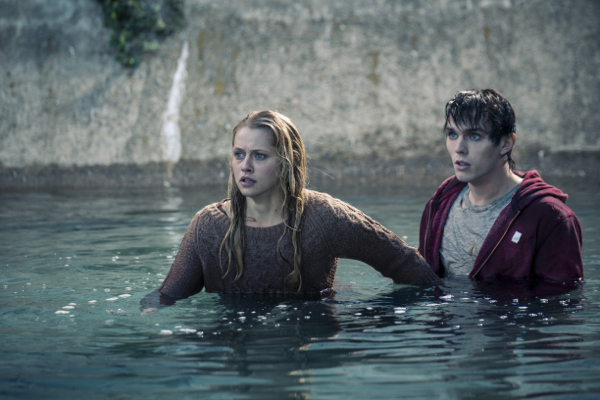Movie review by Greg Carlson
Jonathan Levine’s adaptation of Isaac Marion’s novel “Warm Bodies” endeavors to resurrect the durable zombie genre as a kinder, gentler post-apocalypse by injecting into the proceedings the seldom-used but not entirely novel device of romance. Pulse-crossed love hints at a sorta kinda “Romeo and Juliet” attraction between an undead flesh-eater known as R (Nicholas Hoult) and crush-object Julie (Teresa Palmer), a sympathetic human whose father runs the military defense protecting the surviving populace from the incursion of shambling corpses hungry for gray matter. Narrated by R via thoughts his rotting but lucid brain can still form even though his mouth cannot articulate the words, “Warm Bodies” manages to enter territory so few zombie properties even bother with these days: heartfelt earnestness.
Levine spends plenty of time establishing the yearning soulfulness of R, whose slim jeans and red hoodie mark him as something of an emo-cadaver. When not overwhelmed by the urge to dine on the bodies of the living, R resides in the cabin of a jetliner, where he spins records from his impressive collection of vinyl and scavenges abandoned treasures like a decaying WALL-E. One day, along with a pack of shambling ghouls, R encounters Julie’s patrol, and overwhelmed by something that transcends his flatlined state, refrains from killing the young woman. He protects her from the horde, and her presence sparks in R a gradual return to a condition of vitality.
Disappointingly, “Warm Bodies” does not fully commit to directly addressing what amounts to its elephant in the room: necrophilia. Hoult’s expressive eyes and tousled hair, which contrast with his ghastly pallor, are undoubtedly present to soften the “ick factor” that has never really been a significant problem for cinematic vampires. Even so, the “getting to know you” sections of the film in which R pines for Julie are restrained and chaste, even when some very taboo passion is needed. The most devoted genre fans may be vaguely reminded of Brian Yuzna’s 1993 “Return of the Living Dead 3,” in which screenwriter John Penney explored the romance of a living boy and his reanimated girlfriend.
“Warm Bodies” could have used a rewrite on John Malkovich’s General Grigio, Julie’s grieving, vigilant father. Malkovich’s presence is welcome, but the black-and-white rigidity of his anti-zombie position demands greater nuance, particularly if the audience is going to believe any late occurring change of heart. The final sections of “Warm Bodies,” where Malkovich factors most, are the film’s least effective, driven by fights and chases involving the speedy, aggressive “Bonies,” dried-out zombies who have decayed past the point of rehabilitation. The film never really bothers to define its own spin on zombie mythology, and the audience is asked to accept the death-to-life reversal in other zombies that has been seemingly triggered by R’s affection for Julie.
The courtship of the Shakespeare-inspired pair is hampered by an issue just as thorny as R’s stiff, checked-out status: the disturbing reality that R dispatches Julie’s boyfriend, and by eating his brains can access the victim’s thoughts, visions, and experiences. Reminiscent of unethical Patrick’s voyeuristic manipulation of Clementine in “Eternal Sunshine of the Spotless Mind,” this eerie story element may give some viewers pause no matter R’s otherworldly sweetness. Coupled with the suggestion that R deliberately delays helping Julie get home, (making him a kidnapper) these challenging plot threads need more sophisticated and thoughtful resolution than Levine can offer.
